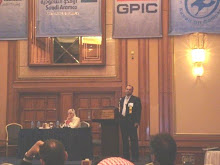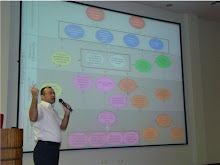In order to overcome strategic implementation difficulties arising at corporate, business and operational levels, we are going to use programme management as the strategic implementation “wheel” underpinned by relevant skills and established learning; not relying on projects with inappropriate systems/processes-a common mistake leading to diffused, diluted, compromised or postponed strategic implementation (Kippenberger, 2000)
With organisational maturity as a baseline, a separate temporary structure is created by developing integrated programmes of projects (Partington,2000) thus strategic change will be managed outside existing culture in a way to integrate projects and business as usual (Murray-Webster et al, 2000).
Configuring strategic/goal oriented programmes (fig below) aims at co-ordination and integration of continuous strategic initiatives across the organization supplemented by portfolio (chunked) and incremental (heartbeats) programmes (Kippenberger, 2000).
Adopting the eco-cycle, presented by Michel Thiry (2000), for programmes to integrate both types of change: deliberate (formal planned top-down strategic change) and emergent (unplanned bottom-up triggered by unanticipated inputs). It consists of two loops, learning and performance. While deliberate change goes through the performance loop (top-down), feedback, and unplanned changes go through the learning loop (multi directional) that facilitates new deliberate decisions (value management).

Figure: The programme eco-cycle, adopted from Thiry, 2000
This method can be employed in Okumus (2003) case to implement strategic changes; however there are many others methodologies that can still be explored.
Regards,
Samer
With organisational maturity as a baseline, a separate temporary structure is created by developing integrated programmes of projects (Partington,2000) thus strategic change will be managed outside existing culture in a way to integrate projects and business as usual (Murray-Webster et al, 2000).
Configuring strategic/goal oriented programmes (fig below) aims at co-ordination and integration of continuous strategic initiatives across the organization supplemented by portfolio (chunked) and incremental (heartbeats) programmes (Kippenberger, 2000).
Adopting the eco-cycle, presented by Michel Thiry (2000), for programmes to integrate both types of change: deliberate (formal planned top-down strategic change) and emergent (unplanned bottom-up triggered by unanticipated inputs). It consists of two loops, learning and performance. While deliberate change goes through the performance loop (top-down), feedback, and unplanned changes go through the learning loop (multi directional) that facilitates new deliberate decisions (value management).

Figure: The programme eco-cycle, adopted from Thiry, 2000
This method can be employed in Okumus (2003) case to implement strategic changes; however there are many others methodologies that can still be explored.
Regards,
Samer

















No comments:
Post a Comment